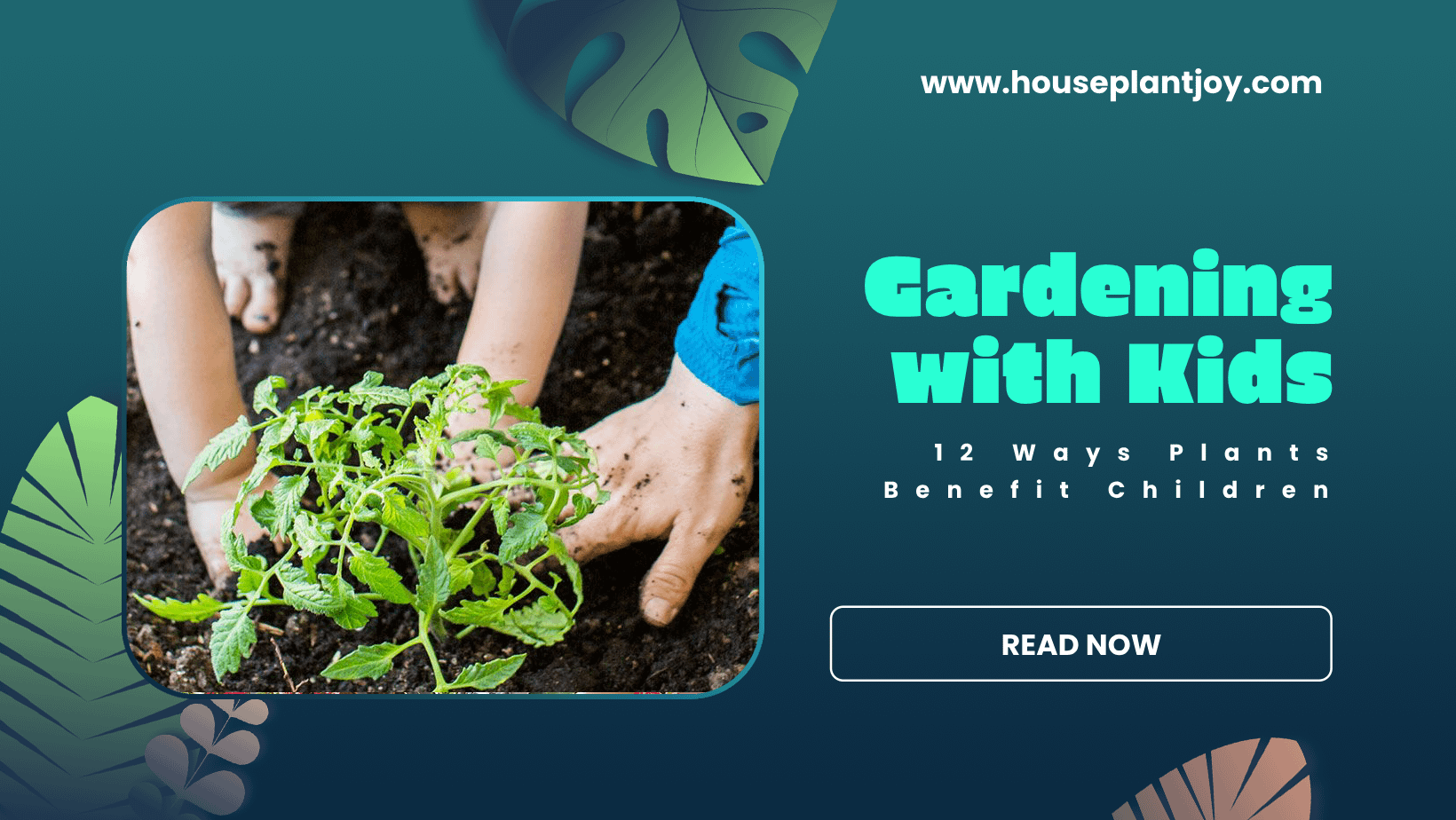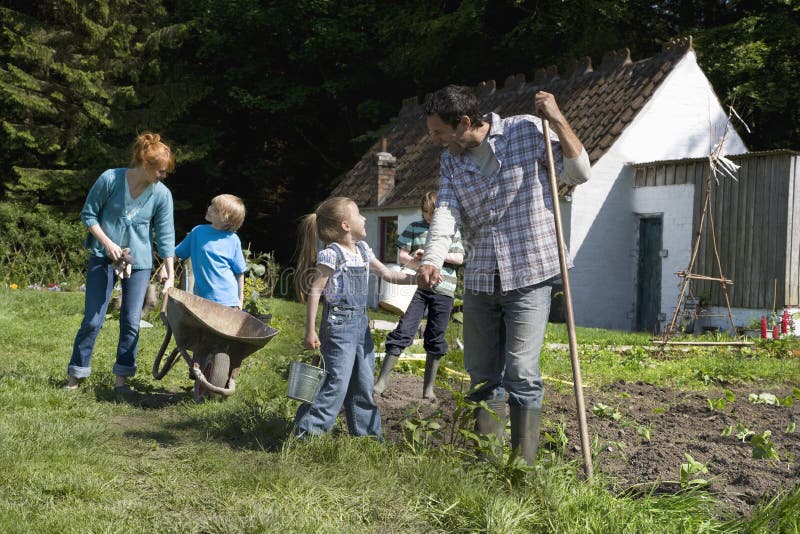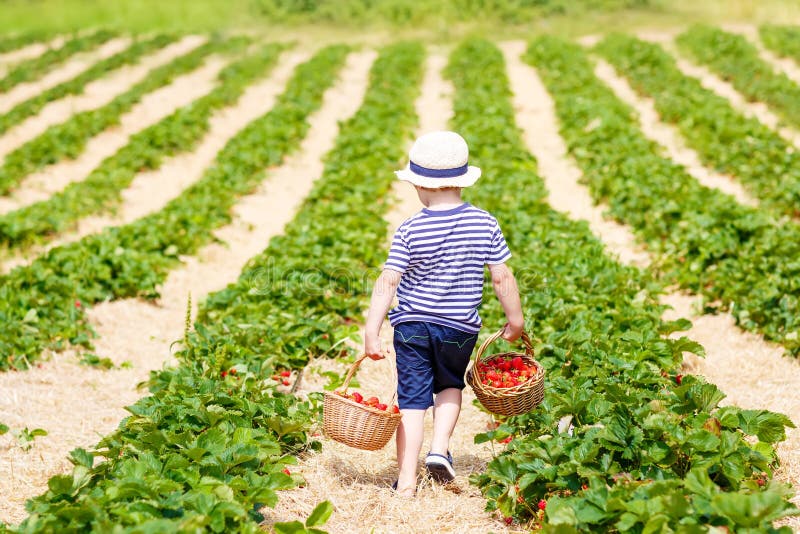HousePlantJoy is supported by our audience. When you purchase through one of our links, we may earn a small affiliate commission. As an Amazon Associate I earn from qualifying purchases. Your cost is not affected.
==================
Have you ever considered a simple houseplant’s incredible impact on a child’s life? From sparking an interest in science to fostering a sense of responsibility, the benefits of gardening with kids go well beyond greenery. In this article, we’ll explore twelve remarkable ways houseplants can enrich children’s lives, whether you’re a homeschooling family or someone eager to nurture growth. Join us as we delve into the world of houseplants and children, uncovering the secrets to making education and joy bloom within your home.
Houseplants become more than decorations through cultivating new hobbies, nurturing an appreciation for the cycle of life, and even encouraging a love for science. These little green teachers offer practical lessons that can last a lifetime. So, whether you’re a seasoned gardener or a curious beginner, get ready to roll up your sleeves and embark on a journey that will let your child’s potential flourish. Let’s watch them grow figuratively and literally as we explore the wonders of gardening with kids.
Plants are like silent superheroes in a child’s life, offering a bouquet of benefits that might often go unnoticed. Yet, these botanical companions leave an indelible mark on their young hearts and minds. While outdoor gardening brings seasonal joy, we’re here to plant the idea of considering houseplants for a year-round adventure.
Picture this: Homeschooling families have woven captivating unit studies around the art of indoor and outdoor gardening. But here’s the twist – the perks extend far beyond academics. Even traditional schools have taken a leaf from this book, discovering that gardening with kids unlocks skills far beyond mere plant cultivation.
Now, how exactly does nurturing little green friends benefit children? We’ve compiled a neat list of twelve ways, but here’s the thing – we’re all ears and would love for you to share your unique additions to this blooming story. After all, the garden of knowledge thrives when we all pitch in.
Gardening with Kids; 12 Ways Plants Benefit Children
1. Learning Skills and Opportunities:
Embarking on learning a new hobby, like gardening, is akin to gaining a treasure trove of skills that will accompany you throughout your life’s adventures. The profound art of learning enriches your hobbies and extends its warm embrace to your interests and career pathways.
2. Appreciating Plant Life Cycle:
Picture the magic of life encapsulated within a tiny seed, slowly unfurling its mysteries until it emerges as a fully-grown plant. Witnessing this wondrous journey imparts a deep sense of appreciation for the intricate and delicate dance of life itself.
3. Understanding Plant Nutrients:
In the gardening world, you’ll delve into the secret language of plants and learn about their nutritional cravings. The sun’s warm embrace and the life-giving touch of water become your allies in this botanical quest, nurturing your profound appreciation for the enchanting world of plant sciences.
4. Exploring Plant Structure:
As you peer closer at plants, you’ll discover an entire universe hidden within their structures – from the delicate root hairs that cling to life to the intricate beauty of a flower’s stigma. Each discovery becomes a stepping stone on the path of scientific curiosity that will enchant children and adults alike.
5. Using Math Skills:
Often seen as mere numbers, math becomes an essential tool in the gardener’s toolbox. You’ll find yourself calculating the precise amounts of nutrients and water needed, pondering over container dimensions and volumes – all while nurturing your plants to vibrant life.
6. Enhancing Reading Skills:
Gardening doesn’t just involve soil and seeds; it’s a journey into the world of words. Your reading skills blossom as you devour pages about plants, their unique characteristics, and the nurturing care they require. Inquisitiveness becomes your guiding light as you explore a wealth of information, from quick facts to extensive articles and books.
7. Immune System Development:
In the beautiful gardening world, there’s more than just plants at play. Research suggests that allowing children to get their hands dirty and play in the soil can help build a robust immune system. So, embrace the joy of getting a little messy in the name of health!
8. Growing Edibles:
Imagine the delight of plucking fresh lettuce and aromatic herbs from your windowsill garden to sprinkle on your meals. This small act of nurturing plants imparts a deeper understanding of food’s value and allows you to embark on culinary experiments.
9. Learning about Bugs:
In your journey as a gardener, you’ll encounter a fascinating world of insects. Some may be pests that harm your plants, while others serve as unsung heroes, protecting and nurturing your green companions. You become a curious entomologist in your backyard by identifying these tiny inhabitants.
10. Developing Responsibility:
Caring for plants is a lesson in responsibility, much like caring for a pet. Each plant is like a unique individual with its own needs. Some may thirst for daily attention, while others prefer a more hands-off approach. Sunlight requirements vary, too. In this nurturing process, you discover the profound impact of your actions.
11. Encouraging Exploration:
Gardening isn’t just about plants; it’s an adventure into uncharted territories. Every day spent tending to your leafy companions stokes the flames of curiosity, motivating you to explore new plants and ideas. It’s a reminder that growth and knowledge go hand in hand.
12. Family Bonding:
In the garden, you’ll find plants and a platform for togetherness. As children become young horticulturists, they eagerly share their plant companions with their families. This nurturing bond often becomes a cherished family activity, where the care of houseplants becomes a shared journey, nurturing both the plants and the relationships.
With so many ways house plants benefit children, families often choose gardening with children in homes and schools.
Are you looking for more information? Please look at our article on Houseplants for Children for ideas and plants to try.
A Grandparent’s Tale: Cultivating Curiosity Through Plant Care
When it comes to sharing the joys of gardening with kids, I can’t help but reflect on the remarkable journey I embarked on with my grandchildren. As a grandparent, I was eager to instill a love for nature and science in them, and what better way to do that than through the care of houseplants?
Nurturing a Love for Greenery
One sunny afternoon, I introduced my grandchildren to our first houseplant, a vibrant spider plant. I explained that they would be responsible for caring for it, teaching them about watering, sunlight, and the plant’s unique needs. Their eyes sparkled with curiosity as they touched the soft leaves and observed the plant’s response to light.
With each passing day, our little gardeners grew more enthusiastic. They watched in awe as the spider plant sprouted new “babies,” they diligently watered it, learning the importance of consistency and patience. This simple act of nurturing a plant was more than just a chore; it was a lesson in responsibility and the beauty of life’s cycles.
A Scientific Adventure at Home
Our journey with houseplants soon turned into a scientific adventure. My grandchildren began to ask questions about the plant’s growth, which led to captivating discussions about photosynthesis, nutrient absorption, and the wonders of nature. We found ourselves researching together, diving into books about botany, and experimenting with different lighting conditions to witness firsthand how they impacted our green companion.
These explorations enriched their scientific knowledge and honed their reading and math skills. Reading about plant care and understanding its science became an exciting part of their daily routine, helping them blossom academically.
A Bond that Blossomed
Our houseplant journey wasn’t just about tending to a living organism; it became a cherished family activity that strengthened our bond. We celebrated each new leaf, marveled at the spider plant’s resilience, and rejoiced in the tiny victories of our nurturing efforts.
As they grew, so did their responsibilities in caring for the spider plant and other green friends we welcomed into our home. This journey not only fostered a love for science and nature but also instilled in my grandchildren a deep sense of responsibility, curiosity, and appreciation for the beauty of life.
Growing Together: Building Immunity and Responsibility through Gardening
In our modern age of screen time and sanitized environments, finding ways to help children build robust immune systems and a sense of responsibility is crucial. Gardening, surprisingly, offers an avenue for both.
The Immune System’s Secret Ally
As we delved into gardening, my grandchildren discovered that playing in the soil wasn’t just fun but also beneficial for their health. Research indicates that exposure to the natural environment, including dirt and microorganisms in the soil, can boost the immune system.
Our gardening adventures involved getting our hands dirty, planting seeds, and transplanting seedlings. While Sarah and Jake enjoyed the tactile experience, little did they know that they were strengthening their immune systems.
Responsibility from Seed to Sprout
Gardening is a lesson in responsibility like no other. Each plant in our garden became a unique individual with specific needs. Some required daily attention, while others thrived with a more hands-off approach. My precious ones learned to differentiate between various plant species and understand their requirements.
They grasped the importance of watering in moderation, ensuring adequate sunlight, and caring for their green companions. This hands-on education in responsibility extended beyond the garden; it influenced their daily lives and how they approached other tasks.
Nurturing Tomorrow’s Green Thumbs
As we conclude our journey through the world of gardening with kids and the myriad ways houseplants can shape young minds, it’s clear that we’ve only scratched the surface of the vast potential these little green companions hold. From igniting a passion for science to teaching responsibility and fostering a love for the natural world, houseplants offer many lessons beyond their vibrant leaves and blossoms.
The magic of gardening with children lies in its power to nurture plants and the future. Every sprout, every leaf, and every bloom is a chance for your child to grow, learn, and blossom. So, whether you’re a parent, a teacher, or simply a curious soul, the call to action is clear – embrace the world of houseplants and watch the wonders of growth and knowledge unfold before your eyes. Encourage children to get their hands dirty, ask questions, and marvel at the beauty of nature. Together, we can cultivate a new generation of green thumbs, nurturing a greener and more curious tomorrow.
Frequently Asked Questions
How can gardening with kids benefit their education?
Gardening with kids offers a hands-on learning experience that enriches their education. It helps children develop various skills, from understanding plant sciences to enhancing reading, math, and scientific knowledge.
Are there specific plants that are ideal for gardening with children?
Yes, child-friendly plants, like succulents, snake, and spider plants, are great for beginners. These plants are easy to care for and provide valuable lessons for kids about plant growth and responsibility.
How can gardening with kids encourage family bonding?
Gardening fosters a sense of togetherness within the family. As children take on the role of young horticulturists, they often share their plant companions with their families, creating a nurturing bond that becomes a cherished family activity.
Cultivate Young Gardeners – Join the Houseplant Joy Community!
Are you passionate about nurturing a love for gardening in the next generation? ? At Houseplant Joy, we’re all about getting children involved in the joy of planting and watching them grow figuratively and literally. Join our vibrant community on social media and be part of the green revolution!
Facebook: Explore engaging content, discover family-friendly plant projects, and read heartwarming stories of kids and plants.
Instagram: Get inspired by stunning plant photos and see how families embrace houseplants with their children.
Pinterest: Find creative ideas for involving kids in gardening, from educational activities to DIY planting projects.
Twitter: Stay updated on the latest tips, ideas, and resources for cultivating young gardeners. Join us today to inspire and be inspired!















